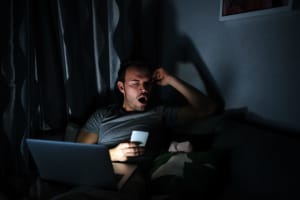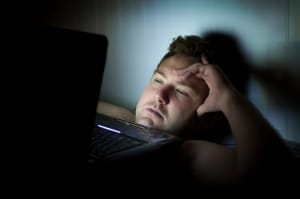Between our phone screens, e-readers, smartwatches and laptop computers, technology is an inescapable part of modern life—seemingly always with us. It connects us to each other and keeps us up to date and entertained.
 But how does technology, and the screens that come with it, affect our sleep?
But how does technology, and the screens that come with it, affect our sleep?
Our devices are designed to be constantly accessible, by our side day and night. We have all stayed up late having digital conversations with friends or binge-watching our favorite show. If you sleep with your smartphone near your bed, you may have woken up to an alert early in the morning or right after falling asleep. Or maybe the season finale of that show left your heart racing, just in time for bed.
A growing body of research shows that our attachment to technology, and all the reasons we love it, can have negative effects on sleep in more ways than one. So how should we interact with our screens in order to get the best night’s sleep? And what activities should we avoid? Read on to learn more about how our screens can impact sleep, and how to get the best rest after a plugged-in day.
How screens affect sleep
To understand how technology influences sleep, it’s important to understand that they do so both physiologically and psychologically. That is, screens have been shown to alter both internal brain chemistry and how we feel when we are trying to fall asleep. Put simply, screen-based technology stimulates our bodies and minds, sometimes just as we are preparing to sleep.
One important way that screens can impact our sleep is by altering the circadian rhythm, or the body’s internal clock. The circadian rhythm is a complex network of hormones and nerves that helps the body know when it is time to sleep, among other functions. To work properly, it depends on stimuli like sounds and light. Artificial light, like the kind from screens, can damage that natural process. Artificial light can also damage sleep patterns known as the sleep cycle. By disrupting natural cycles that the brain experiences during sleep, light can damage sleep quality.
The bright backlights of many modern screens emit LED blue light. Blue light is a short wavelength of visible light that has been shown to harm sleep when viewed in the evening. That’s because blue light from screens mimics the effect of natural blue light from the sun in the body, which can disrupt the circadian rhythm. A 2011 study showed that artificial blue light can increase the suppression of melatonin, a hormone that is an important regulator of the circadian rhythm, in the blood. Inadequate melatonin in the body around bedtime can damage sleep. Another scientific survey found that blue light from screens, and its impact on melatonin, influenced sleep in the following ways:
- Increased in alertness and reduced sleepiness, delaying bedtime and keeping you up
- Reducing phase two REM sleep quality, leading to a less restful night’s sleep
- Delayed sleep onset, making it more difficult to fall asleep once you’re in bed
The psychological effects of technology
 On the psychological side, our attachment to technology can have negative impacts as well. Our sleep can be interrupted by loud alerts, which we are anxious to check. An inability to unplug can cause stress that harms your overall quality during the night. Or, the feelings that entertainment, like shows or games, can elicit may cause emotional excitement, delaying sleep even longer. Attachment to recreational technology like television or video games can even become an addiction that keeps you up well into the night.
On the psychological side, our attachment to technology can have negative impacts as well. Our sleep can be interrupted by loud alerts, which we are anxious to check. An inability to unplug can cause stress that harms your overall quality during the night. Or, the feelings that entertainment, like shows or games, can elicit may cause emotional excitement, delaying sleep even longer. Attachment to recreational technology like television or video games can even become an addiction that keeps you up well into the night.
The scientific survey referenced above describes the potential negative behavioral and psychological effects of screen use, specifically on children and adolescents:
- Behavioral bedtime delay as individuals postpone bedtime to consume media
- Exciting, thrilling or violent content can increase heart rates and delay sleep onset
- Though it is unproven, there is growing concern among scientists that internet and video game addiction—uncontrollable or excessive technology habits especially related to massively multiplayer online role-playing games (MMORPGs)—can harm sleep
Screens can make it difficult to sleep in more ways than one, so managing our relationship with them is important, and may take some time to put into effect. Still, it is possible, necessary even, to think hard about the ways that you can limit screen time. Read on to learn more about creating healthy screen habits for adults, children and the entire family.
How to create healthy screen habits for better sleep
Technology and the screens that come with it are a huge part of our daily lives, and disconnecting can be difficult. Developing a habit of moderate screen usage is as important as any other routine. Although to some, a screen-time routine might sound far-fetched or unreasonable, an intentional effort to commit to a screen-time routine, like any other healthy habit, can lead to tangible improvements in sleep over time. Generally, screens (yes, even TVs) should be kept out of the bedroom, especially for children.
 Any routine should be clearly communicated to other members of the household and followed as regularly as possible. Recognizing the impact technology can have on sleep for children, in particular, can lead to lasting improvement in their overall health. So, parents should work to model good technology habits for children and monitor for age-appropriate content, when possible. The 2019 survey suggests creating a screen-time routine that includes the following steps:
Any routine should be clearly communicated to other members of the household and followed as regularly as possible. Recognizing the impact technology can have on sleep for children, in particular, can lead to lasting improvement in their overall health. So, parents should work to model good technology habits for children and monitor for age-appropriate content, when possible. The 2019 survey suggests creating a screen-time routine that includes the following steps:
- Avoid exposure of screens and electronics at least an hour before bedtime
- Replace nighttime screen usage with relaxing activities like reading or coloring
- Keep all screens and devices (TVs, video games, computers, tablets, and smartphones) out of the bedroom
- Avoid using screens as background noise: you can be affected by screen media even when you are not actively engaged.
- Avoid violent or exciting media, which can negatively affect sleep.
 Adults and families with children should consider the screen-time routine as part of a larger mental health routine. Getting quality sleep is critical for the health of adults and children, and a variety of environmental factors can impact overall health. In fact, other daytime behavior and habits like exercise and diet can influence your quality at night.
Adults and families with children should consider the screen-time routine as part of a larger mental health routine. Getting quality sleep is critical for the health of adults and children, and a variety of environmental factors can impact overall health. In fact, other daytime behavior and habits like exercise and diet can influence your quality at night.
In addition to the steps above, it is possible to create a sleeping environment that is ideal for quality sleep. To relax and properly prepare for sleep, incorporate these tips into your day:
- Set and abide by regular bedtimes
- Create a regular bedtime sequence of events and follow it consistently
- Maintain cool, comfortable, dark and quiet bedrooms
- Avoid consuming sugar, caffeine, alcohol, and nicotine at night
- Regularly exercise for at least 30 minutes, outdoors when possible, during the daylight
RELATED: 8 Tips for a Better Nights Sleep